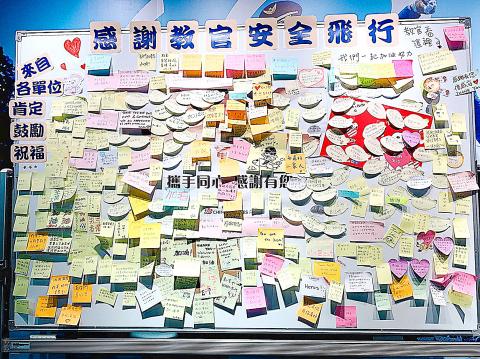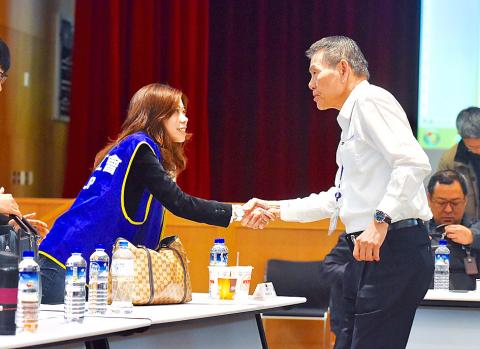The Taoyuan Union of Pilots and China Airlines Ltd (CAL, 中華航空) reached a preliminary agreement on changes to pilot deployment following nearly 11 hours of negotiations that began at 1am yesterday, but the union said that the strike would continue for a seventh day today, as all the pilots’ demands have not been met.
From Friday last week, when the strike began, until Tuesday, the airline had to cancel 107 flights, affecting about 18,000 passengers.
Flights scheduled from yesterday until Wednesday next week would account for another 80 cancelations, the company said.

Photo courtesy of a reader
One-sixth, or 91, of the striking pilots have reclaimed their flying certificates since Tuesday, the Liberty Times (the sister newspaper of the Taipei Times) reported yesterday, adding that most of the pilots flew Airbus A350 aircraft.
The union previously claimed that it had obtained the certificates of 622 China Airlines pilots.
Both sides agreed to meet at 10am today to continue negotiations over unresolved issues.

Photo: Huang Yao-cheng, Taipei Times
The union said that it has canceled a plan to hold a sit-in in front of the Ministry of Transportation and Communications building in Taipei.
Before the talks began, Minister of Transportation and Communications Lin Chia-lung (林佳龍) addressed both sides, affirming their willingness to sit down to negotiations, despite their differences.
Everyone holds flight safety as being of the utmost importance, he said.
“Remember that you are all members of one big family. Employees in management positions and those in the union are the airlines’ most valuable assets. If the labor dispute continues, the company will lose not only customers and revenue, but also the public’s trust,” he said.
“It would hurt a brand that has taken years to establish, which I am afraid would be a loss that you would never, ever redeem, no matter how hard you try,” he said.”
In the second round of negotiations on Monday night, the union refused to consider a compromise proposed by the ministry, to review fights of six to eight hours and determine the number of pilots to be dispatched.
Saying that a route review would be too tedious, the union proposed a rule that could decide when to dispatch an additional pilot: A third pilot would accompany multi-leg flights of more than seven hours.
However, during the third round of negotiations, the union no longer insisted on sending three pilots on multi-leg flights of at least seven hours, but provided a list of 10 routes that it said could lead to pilot fatigue.
The company only agreed on five of the routes.
Three pilots would be dispatched on round-trip cargo flights between Anchorage, Alaska, and New York City, while a red-eye cargo flight to Chongqing, China, would have four pilots.
Three pilots would be sent on passenger flights to Xian, China, as well as those to Palau.
Passenger flights to Guam would still have two pilots, but the company agreed to arrange for the pilots to spend the night in a hotel after landing.
The union agreed that implementation of the new dispatch rules could be timed differently for the five routes, as the company must make arrangements.
The airline had already agreed on Monday night to send three pilots on flights of more than eight hours and four pilots on flights longer than 12 hours.
Yesterday, it confirmed that 30 weekly flights would be affected, including those to San Francisco; Frankfurt, Germany; Amsterdam; Rome; and London’s Gatwick Airport.
However, the two sides could not hash out issues related to the recruitment of more local pilots.
The union has demanded that China Airlines stop hiring captains from other nations and start training Taiwanese copilots into captains.
The percentage of foreign pilots in China Airlines should be reduced to 5 percent within three years, it added.
The company should announce captain vacancies for each aircraft fleet annually, with a prioritized list for captain training that the pilots could refer to.
Seniority should be the main criteria for prioritizing pilots on the training list, the union said, adding that union representatives should be allowed to attend the meetings in which lists are compiled.
The union said that a ratio of union members to nonmembers governing trainee selection.
China Airlines only agreed to a public list, rejecting the union’s other training demands.
There is no reason to lower the percentage of foreign pilots, who account for about 10 percent of flight personnel, the company said, adding that foreign pilots assist the airline under special circumstances, such as labor strikes.
China Airlines said that it provides well-rounded training for pilots, who are promoted based on performance rather than seniority.
“It is illogical to select a pilot based on union membership,” the company said.
Copilots from Taiwan, as well as those hired from other nations, should have an equal opportunity to be promoted to captain, it said.

Tropical Storm Gaemi strengthened into a typhoon at 2pm yesterday, and could make landfall in Yilan County tomorrow, the Central Weather Administration (CWA) said yesterday. The agency was scheduled to issue a sea warning at 11:30pm yesterday, and could issue a land warning later today. Gaemi was moving north-northwest at 4kph, carrying maximum sustained winds near its center of up to 118.8kph and gusts of 154.8kph. The circumference is forecast to reach eastern Taiwan tomorrow morning, with the center making landfall in Yilan County later that night before departing from the north coast, CWA weather forecaster Kuan Shin-ping (官欣平) said yesterday. Uncertainty remains and

SEA WARNING LIKELY: The storm, named Gaemi, could become a moderate typhoon on Wednesday or Thursday, with the Taipei City Government preparing for flooding A tropical depression east of the Philippines developed into a tropical storm named Gaemi at 2pm yesterday, and was moving toward eastern Taiwan, the Central Weather Administration (CWA) said. Gaemi could begin to affect Taiwan proper on Tuesday, lasting until Friday, and could develop into a moderate typhoon on Wednesday or Thursday, it said. A sea warning for Gaemi could be issued as early as Tuesday morning, it added. Gaemi, the third tropical storm in the Pacific Ocean this typhoon season, is projected to begin moving northwest today, and be closest to Taiwan on Wednesday or Thursday, the agency said. Today, there would likely

DISRUPTIONS: The high-speed rail is to operate as normal, while several airlines either canceled flights or announced early departures or late arrivals Schools and offices in 15 cities and counties are to be closed today due to Typhoon Gaemi, local governments announced last night. The 15 are: Taipei, New Taipei City, Taoyuan, Tainan, Keelung, Hsinchu and Kaohsiung, as well as Yilan, Hualien, Hsinchu, Miaoli, Chiayi, Pingtung, Penghu and Lienchiang counties. People should brace for torrential rainfall brought by the storm, with its center forecast to make landfall on the east coast between tonight and tomorrow morning, the Central Weather Administration (CWA) said. The agency issued a sea warning for the typhoon at 11:30pm on Monday, followed by a land warning at 11:30am yesterday. As of

CASUALTY: A 70-year-old woman was killed by a falling tree in Kaohsiung as the premier warned all government agencies to remain on high alert for the next 24 hours Schools and offices nationwide are to be closed for a second day today as Typhoon Gaemi crosses over the nation, bringing torrential rain and whipping winds. Gaemi was forecast to make landfall late last night. From Tuesday night, its outer band brought substantial rainfall and strong winds to the nation. As of 6:15pm last night, the typhoon’s center was 20km southeast of Hualien County, Central Weather Administration (CWA) data showed. It was moving at 19kph and had a radius of 250km. As of 3pm yesterday, one woman had died, while 58 people were injured, the Central Emergency Operation Center said. The 70-year-old